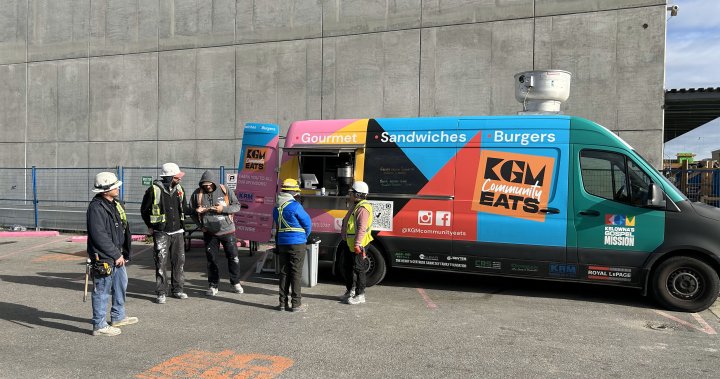Construction crews working on a major condo tower project in downtown Kelowna, B.C., have been enjoying meals from a food truck operated by the Gospel Mission, a local homeless shelter. Unlike most food truck operations, this one is run by a non-profit organization, with the goal of providing meals to construction workers as well as generating revenue for the shelter’s services. The Gospel Mission acquired two food trucks through grants a couple of years ago, with one being used for outreach and the other being stationed at the construction site. Construction workers have been supporting the food truck since it opened in April, and the revenue earned goes directly back into the shelter’s programs.
The money earned at the food truck benefits the Gospel Mission’s outreach team and transitional employment program. With over 700 meals being provided daily at the shelter, the addition of the food truck has proven to be a successful social enterprise. The revenue from the food truck has been significant, with over $30,000 made in the first quarter of operation. This steady source of income allows the organization to continue providing services without relying solely on grants and public donations, which can be inconsistent and short-term.
The additional stream of revenue from the food truck has allowed the Gospel Mission to hire some of its shelter residents, providing them with employment opportunities and the chance to gain work experience. This employment program has been beneficial for the residents, allowing them to build resumes and work habits that can help them transition to other jobs in the future. The success of the food truck concept has prompted the organization to consider expanding to other construction projects once the current project is completed. By leveraging the food truck as a social enterprise, the Gospel Mission is able to support its residents while also providing meals to the construction workers.
The Gospel Mission’s executive director, Carmen Rempel, emphasized the importance of having unrestricted funds to support the organization’s programs and services. The revenue generated from the food truck allows the Gospel Mission to continue its work in providing meals, assistance to the homeless, and employment opportunities for shelter residents. As a non-profit organization, the Gospel Mission relies on initiatives like the food truck to sustain its operations and make a meaningful impact in the community. The success of the food truck at the construction site has demonstrated the potential for social enterprises to benefit both the organization and the community it serves.
Overall, the partnership between the Gospel Mission and construction workers at the Water Street By The Park project showcases the positive impact of social enterprises in addressing community needs and generating revenue for non-profit organizations. By providing meals to construction crews and generating income for its programs, the Gospel Mission is able to support its residents and create employment opportunities. The success of the food truck initiative highlights the potential for similar projects to be implemented in other construction projects, ultimately benefiting both the organization and the community at large. The Gospel Mission’s innovative approach to creating social impact through the food truck demonstrates the importance of leveraging resources and partnerships to address social issues and create positive change.













